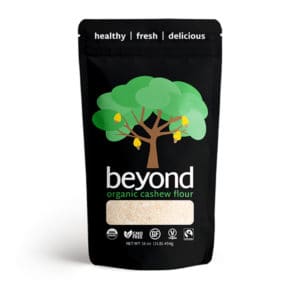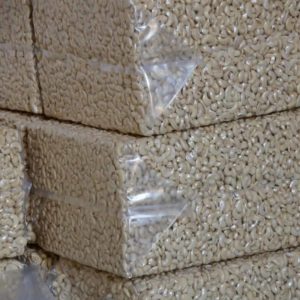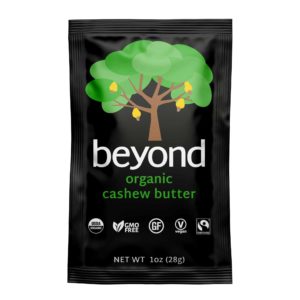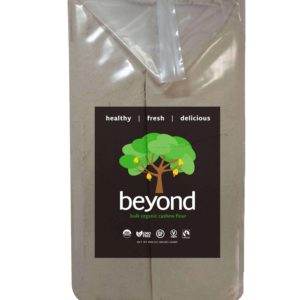You may have caught wind recently of new kinds of nut butters popping up to challenge peanut butter, the reigning champ. The truth is, these butters aren’t new and have been around for quite a while. Cashew butter, for example, was actually rationed out during the Cold War as a part of civil defense survival kits in the United States. Cashew butter is an easy to make, healthy option that adds deliciousness to a number of foods.
Cashews! All it takes to make cashew butter is a cup of simple, plain cashews, though you can of course add salt or other seasonings. Including ingredients like cinnamon, sugar, or chili flakes can create a variety of interesting flavors for your butter.
A food processor or heavy duty blender works best for blending your cashews, but choose whatever appliance you’re most comfortable using. Note that it might take around 10-15 minutes of blending to get the consistency you want. You might choose to add a touch of oil at the end of the blending process to smooth out the batter, especially if starting with raw nuts.
On average, most cashew butter will only contain salt, cashews, and maybe a small amount of oil. You can also try experimenting with other seasonings if you’re going for a specific flavor.
While most nut butters offer some nutrients, cashew butter is one of the healthiest options out there. Here are just a couple benefits of choosing cashew butter:
This essential mineral keeps the body fit and healthy. Regular consumption of magnesium helps maintain muscle mass and boost the metabolic functions and immune system in the body. Magnesium also regulates blood pressure levels and calcium absorption. Cashew butter is a great way to get this mineral in your diet since cashews are packed with magnesium.
All nut butters, like all nuts, will contain fat. However, the fats in cashews tend to be healthier, polyunsaturated and monounsaturated fats. Cashew butter also contains less fat than other nut butters, especially peanut butter. Cashew butter also boasts less sugar and calories than peanut butter, making it a much healthier option than the other nut butters out there.
Cashew butter might offer less protein than other nut butters, but it still contains a decent amount while also containing less fat and sugar. If you don’t eat a lot of animal meat, cashew butter supplements your diet nicely and provides protein from a vegetable source.
Iron in your diet helps prevent anemia and fatigue. Cashew butter is filled with iron, especially when it’s made using raw cashews. Raw cashew butter also contains selenium which helps promote health by keeping free radicals from causing damage to cells and DNA membranes.
Cashews are well known for improving heart health and preventing cardiovascular diseases. The polyunsaturated and monounsaturated fats in cashews help maintain low cholesterol, which helps reduce the risk of various heart diseases.
Diabetes is sadly becoming more common these days and can also lead to serious restrictions and health issues. It’s always better to try preventing diabetes rather than dealing with it after it develops, and cashew butter helps regulate blood sugar levels— the biggest culprit of diabetes.
Few things are as irritating or painful as gallbladder stones. Luckily, cashew butter has been studied to reduce the risk of developing these stones— especially in women who are more likely to get them.
Thanks to its lower sugar content, cashew butter is much less addictive than other nut butters, allowing people to more easily regulate their intake. However, you should still be cautious of your cashew butter consumption- you can definitely have too much of a good thing! Just 100 grams of cashew butter can fulfil your recommended daily intake of fat, so you should monitor your diet to make sure you aren’t consuming too much.
Incorporating cashew butter into your diet is super easy and rewarding. Because it’s so mild, cashew butter works well as a dairy substitute in a wide variety of items. Some examples include sweets like cheesecake or smoothies or savory dishes like creamy sauces or soups. Adding a spoonful of cashew butter to coffee or tea instead of milk is another great option.
Many people use cashew butter as a direct substitute for peanut butter, usually as a spread. Cashew butter works brilliantly on sandwiches, toast, fruit, or even just with a spoon.
Cashew butter also works well with a number of full entrees. Use it as a sauce on chicken dishes or as an ingredient in pasta sauce! Cashew butter adds nutritional value and strong flavor to any of your meals.
Both raw or roasted cashews work perfectly as a base for cashew butter, depending on what your goals are. Be sure to try both to decide which you prefer.
Roasted nut butter has a richer flavor overall, making it perfect on crackers, toast, or fruit. Meanwhile, raw cashews work best for replacing dairy in your meals due to their creamy texture. Both types of cashews will work for baking unless your recipe asks for a specific form.
It’s important to note that roasted nut butters tend to spoil faster than their raw counterparts since the roasting process leaves them vulnerable to oxidation. To keep oxidation at bay for any nut butter, be sure to stick it in the fridge.
No matter how you choose to get your cashew butter, the ingredients will always be the most important element to consider. All cashews at Beyond the Nut are fair trade, GMO-free, vegan, and gluten-free, giving you a head start on your healthy snack.


snack size
Sale!


Free shipping on all U.S. orders over $25! Dismiss
Reviews
There are no reviews yet.